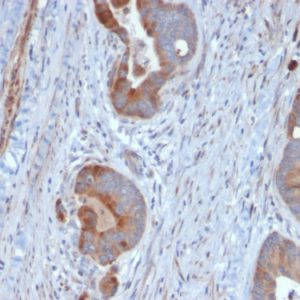Free Shipping in the U.S. for orders over $1000. Shop Now>>

Cytokeratin 6 (CK6) is a protein encoded by the KRT6 gene on chromosome 12q13.13 in humans. It typically consists of around 564 amino acids and has a molecular weight of approximately 62 kDa. Post-translational modifications of CK6 include phosphorylation, glycosylation, and the formation of disulfide bonds, which contribute to its structural stability and functional diversity. CK6 is primarily an intracellular protein, forming intermediate filaments that provide mechanical support and integrity to epithelial cells, particularly in response to mechanical stress or injury.
It is expressed in various organs and tissues, including the skin, hair follicles, oral mucosa, and nails. The expression of CK6 is tightly regulated, often induced during wound healing or pathological conditions involving epithelial hyperproliferation or inflammation. Research suggests that dysregulation of CK6 expression may be associated with various dermatological disorders, such as psoriasis, epidermolysis bullosa simplex, and palmoplantar keratoderma. Additionally, CK6 expression has been implicated in certain cancers, including squamous cell carcinomas and breast cancer, where it may contribute to tumor progression and invasion.
In cancer, the expression of CK6 can provide valuable information about tumor characteristics, disease progression, and patient outcomes. For example, immunohistochemical staining for CK6 is often used in pathological diagnosis to differentiate between different types of tumors and to identify the epithelial origin of malignancies. In breast cancer, CK6/KRT6 expression has been associated with basal-like subtypes, which tend to be more aggressive and have poorer outcomes.
In addition to its diagnostic utility, CK6 expression has also been linked to prognosis in certain cancers. High levels of CK6 expression have been correlated with advanced disease stage, tumor aggressiveness, and poor patient survival in various malignancies. For instance, in head and neck squamous cell carcinoma (HNSCC), elevated CK6 expression has been associated with a higher risk of recurrence and decreased overall survival. Similarly, in breast cancer, CK6 expression has been linked to poorer response to therapy and worse prognosis. Furthermore, in psoriasis and epidermolysis bullosa simplex, CK6 expression patterns can provide diagnostic information and insights into disease severity and progression.
NeoBiotechnologies offers a variety of antibodies against CK6 that have been validated for flow cytometry, immunofluorescence, and immunohistochemistry. Additionally, we hold exclusive rights to CK6 antibodies available for licensing or collaboration [https://www.neobiotechnologies.com/shop/?s=KRT6].
Keratin, type II cytoskeletal 6B, Cytokeratin-6B, Keratin-6B, Type-II keratin Kb10, CK6B; Keratin Type II Cytoskeletal 6B; KRT6B
Showing the single result

Showing the single result

